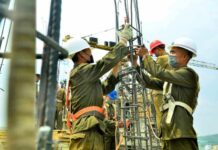[imText1]Yanji, China — A source reported on January 22 that “North Korean authorities will control strictly their citizens’ visit to China in May 2008 for fear of North Korean visitors’ contact with foreigners visiting China for the Beijing Olympics.”
The source explained that “The National Security Agency conveyed to the provincial security agencies an internal order entitled, ‘Strengthen the examination of those who go to China for private business from May 2008, in order to prevent in advance troubles which may occur through contact with foreigners in China.’”
The internal order indicates that the foreign affairs section of the NSA is in charge of the first judgment regarding the issuing of passports, verifying the Chinese relatives of the applicants for the passport and elaborately examining the applicants’ private information.
He added that, “It is included in the order that the person in charge of issuing passports will be subject to punishment if the passport possessor does not return to North Korea by the appointed day or is involved in illegal actions.”
The illegal actions indicated by NSA were: attempting to go to foreign countries, coming into contact with Christians, and bringing prohibited items such as mobile phones, radios, CDs or DVDs into North Korea.
The regulations regarding visitors to China are known to be tough. Only retired individuals among Party members or Party members’ families can apply for the passport. They must not have any criminal record.
The way to verify the truth about the visitors’ relatives in China is to compare the data of residents’ registration with the contents of the invitation from the Chinese relatives. Through this assessment of personal documents, the authorities examine the family background and the criminal records of both applicants and their family members.
After returning to North Korea, visitors take the NSA’s examination for 3 to 6 months. They must write confession essays regarding the places they visited, the persons they met in China, and their impressions of the country – three to ten times repeatedly. If the whole set of confession essays coincide exactly with each other, then the process of the examination is over.
The reason why North Korea is trying to strengthen immigration management, in spite of these already strict immigration regulations, seems to be that the authorities feel the burden from the attention that may be paid to the inside of North Korean society from the international community during the Beijing Olympics.
Mr. Choi, who is a resident of Pyongyang and visited Dandong in China early in January, said, “I heard many times the lecture of, ‘Don’t meet South Koreans or foreign reporters. Don’t tell anything about domestic situations.’ I submitted a written pledge to the NSA saying that, ‘I will definitely come back to North Korea in three months,’ right before leaving North Korea.”
However, an NGO activist working in Yanbian explained that “These days, North Korean visitors in China are not reluctant to meet foreign experts or western media.”
Mr. Jang, a missionary working around China-North Korea border area foresaw that, “If North Korean authorities were to completely ban immigration to China during the Olympics, it would negatively influence the North Korean economy anyhow.” He pointed out that, “A visitor brings generally anywhere from a minimum of 500 dollars to thousands of dollars of cash or products into North Korea, once they come back from China.”



















